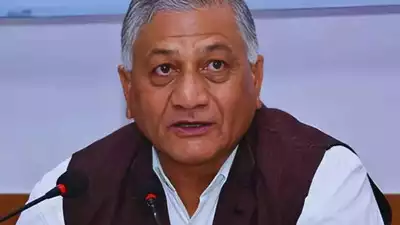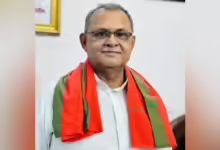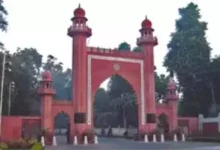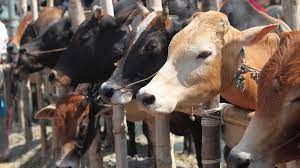Today in Ghaziabad, there are several ripples rather than a single wave of voting
Raj Babbar, Rajnath Singh, and Gen. VK Singh Once upon a time, Ghaziabad was the center of attention for stars in every sky, and it enjoyed it. The LS polls for 2024 are different. Like the cars swishing by the frenetic expressways in the constituency, the big guns have eschewed NCR this time. The majority of the flags, placards, and slogans are gone. However, there are advantages to not having VIPs.

Campaigns with luminaries tend to focus more on people than on policy. The talk and emphasis are on problems when names from the headlines are omitted.
The public discusses issues rather than candidates in Sahibabad’s messy vegetable and fruit mandi (wholesale market), which smells of overripe fruits and decaying trash. But it seems that the voter has chosen which party to support in these divisive political times. Furthermore, some people’s choices have not been impeded by urgent matters.
An OBC named Sachin Kumar Prajapati, carrying a little bag of watermelons on his shoulder in the summer heat, enumerates a lengthy list of complaints. He adds, “Garib piss raha hai” (the poor are being squeezed) and goes on to explain. He discusses the lack of power, the exorbitant costs of private education, the poor quality of public education, and, most importantly, the destruction of crops by cattle. “From the moment you plant it, you must protect your harvest. It vanishes in a day if you depart. However, he will support the BJP. “It has always been,” the over-30 fruit merchant replies. He doesn’t provide a reason.
Compared to Prajapati, Rajnish Kumar, a Baniya by caste who makes his livelihood by selling cottage cheese, is happy. Among other reasons, he believes that MLAs and MPs need to work together, which is why he wants the BJP to win. “How do they coordinate in other ways?” Rajnish motives. He and BJP candidate Atul Garg, 59, are of the same caste. The crowded ancient market in the town provides a respectable vote base for the present MLA from the Ghaziabad assembly. In 2017, the four other assembly segments of the seat, namely Londa, Muradnagar, Sahibabad, and Dholana, also cast saffron ballots.
Businessman Garg is competing against 40-year-old Congresswoman Dolly Sharma. She is a well-known figure in local politics, much like Garg. Gen. VK Singh, who received over 5 lakh votes and nearly 62% of the vote in 2019, was able to retain the BJP seat in Ghaziabad. Sharma, an MBA, and a past mayoral candidate were among his opponents running for Congress. With 1.1 lakh votes, or about 7% of the total, she had won. However, Sharma will benefit this time from the party’s partnership with the SP, which garnered close to 4.5 lakh votes (29%) in 2019.
Ghaziabad, situated on the eastern periphery of the nation’s capital, is a jumble of people and places, with one foot firmly planted in the present and the other in the past. According to 2011 data, the child sex ratio is 850, which is lower than the state average of 902, while the literacy rate is 78%, which is higher than the state average of 68. Although votes from the suburban middle-class colonies of Indirapuram, Vasundhara, and Vaishali will also be vital to the result, large portions of the constituency are rural or semi-urban. One of them is occupied by 61-year-old Pawan Sharma. The former soldier claims his pension increased dramatically, from Rs 7,200 in 2006 to Rs 38,000 in 2024. “I vote somewhere else,” the Brahmin Sharma asks. The district’s Brahmin, Muslim (25%), Dalit (16.5%), Thakurs, and Jat populations are statistically significant.
Fruit vendor Shamim (who goes by one name) claims that things have become worse in his society. He discusses the high rate of unemployment and the psychological effects of the NRC and CAA on Muslims. The government is always discussing the introduction of new legislation. The fifty-year-old fruit vendor admits, “We are a little afraid of the new laws.” He is against EVMs. “Why can’t we go back to the ballot paper when so many people have protested against them?” He intends to vote for Congress as a former SP voter.
Shahid Ali Khan, who runs a pharmacy in the adjacent city of Maharajpur, concurs. Khan claims that under Modi, the nation has deteriorated. He declares, “Education and health are zero.” “The media is solely to blame if people continue to claim that Modi has magic.” He thinks Dolly Sharma has a good chance.
Mason Satyavan and another business owner, Mukesh Bharti, who are both Dalits and live close to Kadkad, also want to vote for Congress. “Many will cast BSP ballots. However, some people, like us, want our votes to matter, Bharti says. A Valmiki named Satyavan confirms.
The settlement of Kadkad has a Thakur predominance. In addition to having a Rajput dharamshala and a temple where pran pratishtha was performed on the same day as in Ayodhya, the hamlet is home to Rawals, Ranas, Gehlauts, and Chauhans. Roop Singh Rawal praises Modi while seated outside his grocery shop for building desh ka samman, or national pride, and, above all, for the Ram Mandir. He claims that “nobody else would have done it.” Mahesh Thakur, an electrical worker at the mandi, has similar opinions. “The main character is Hoon,” he says.
It has been widely reported in recent weeks that Rajput dissatisfaction with the BJP stems from the denial of seats in western Uttar Pradesh, namely to Gen. VK Singh, as well as other problems pertaining to cultural pride. According to Rawal, the community leaders don’t have enough influence to get everyone in the neighborhood to act on their words. “That will be evident from the results,” he claims.







